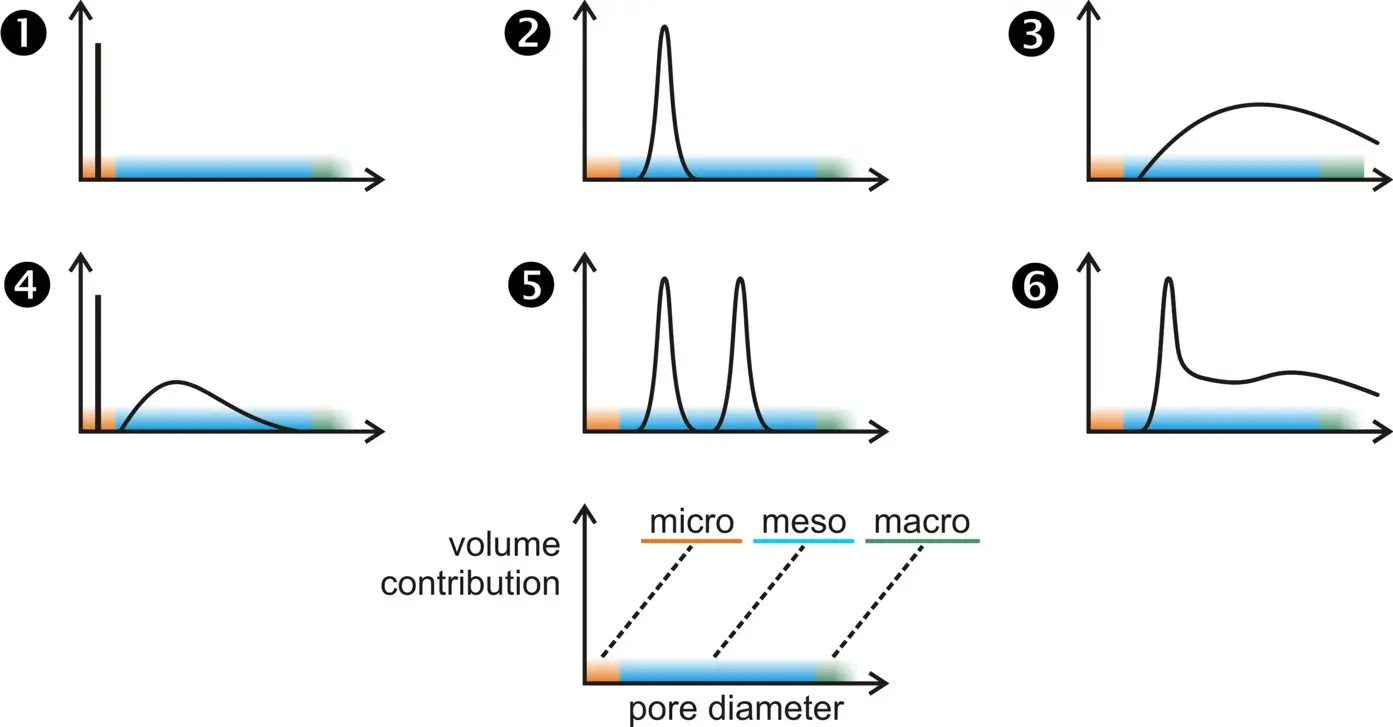Multimodal Porous Particles
Description
Ordered silicate-based porous materials have been at the forefront of research efforts in various fields, including heterogeneous catalysis, drug delivery, adsorption and separation, environmental remediation, photonics, optoelectronics, and sensing. Conventional ordered porous materials, such as zeolites or mesoporous silica, feature a primary pore size that largely defines their respective structural properties. In many cases, the unimodal pore size distributions of these materials are, however, considered a disadvantage. Diffusion is hindered in small pores, whereas the presence of large pores leads to a reduced surface area. In the context of loading a porous host with guests, the uptake is inefficient in small pores, but leaching of the guests becomes an issue in hosts with large pores. The combination of differently sized pores and various pore systems in a single particle while controlling important properties such as surface functionality and particle size is highly desirable, but challenging. The characterization of such multimodal porous particles is of similar complexity and requires the interplay of multiple methods. The objective of this project is the development of new pathways for the synthesis and characterization of multimodal porous materials, primarily core-shell, hybrid, and hollow particles. Materials of the core-shell type will be designed with functional cores surrounded by silica shells with tailor-made porosity. Hybrid particles are prepared by selective and partial pseudomorphic transformation to combine one-dimensional and three-dimensional pore structures, whereas hollow particles result from hard templating and pseudomorphic transformation. The multimodal porous particles prepared in this project will be used to investigate the storage and release of substances in function of the pore structure by means of in situ fluorescence monitoring. Furthermore, a hard templating approach will be employed to prepare multimodal porous organic polymer particles with large surface area. The combination of this approach with molecular imprinting is expected to yield materials with efficient molecular recognition capabilities.The project aims to expand the structural diversity of porous materials and to provide concepts for the design of multimodal porous particles with properties that are optimized for specific applications. The availability of multimodal porous materials with well-defined structure will lead to a refinement of characterization methods, in particular in the field of gas sorption. By using the multimodal silicate-based materials as hard templates and transferring the defined multimodal porosity to organic polymers, the samples prepared in the course of the project cover a wide range of chemistries. This large structural and chemical diversity is the key to tailor-made porous particles and to an effective utilization of these materials in a wide range of applications.
Key Data
Projectlead
Project team
Samuel Gallagher, Michael Reber, Nicola Zucchetto
Project status
completed, 05/2017 - 04/2021
Institute/Centre
Institute of Chemistry and Biotechnology (ICBT)
Funding partner
SNF-Projektförderung / Projekt Nr. 172805
Project budget
413'000 CHF
Publications
-
Multiple equilibria describe the complete adsorption isotherms of nonporous, microporous, and mesoporous adsorbents
2022 Calzaferri, Gion; Gallagher, Samuel H.; Brühwiler, Dominik
-
Silica particles with fluorescein-labelled cores for evaluating accessibility through fluorescence quenching by copper
2021 Gallagher, Samuel H.; Schlauri, Paul; Cesari, Emanuele; Durrer, Julian; Brühwiler, Dominik
-
Entropy in multiple equilibria : argon and nitrogen adsorption isotherms of nonporous, microporous, and mesoporous materials
2021 Calzaferri, Gion; Gallagher, Samuel; Brühwiler, Dominik
-
Hollow silica cubes with customizable porosity
2020 Gallagher, Samuel; Trussardi, Olivier; Lipp, Oliver; Brühwiler, Dominik
-
The structure of mesoporous silica obtained by pseudomorphic transformation of SBA-15 and SBA-16
2018 Zucchetto, Nicola; Reber, Michael; Pestalozzi, Lias; Schmid, Ramon; Neels, Antonia; Brühwiler, Dominik
-
Strategies for localizing multiple functional groups in mesoporous silica particles through a one-pot synthesis
2018 Zucchetto, Nicola; Brühwiler, Dominik
-
Synthesis of advanced mesoporous materials by partial pseudomorphic transformation
2018 Reber, Michael; Zucchetto, Nicola; Brühwiler, Dominik

